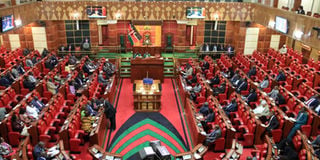Proportional representation more democratic

The National Assembly in a previous session. Proportional representation will ensure minority parties access representation. PHOTO | FILE | NATION MEDIA GROUP
What you need to know:
- To achieve that, we need to change our election system to one based on proportional representation, where every vote actually counts.
- Kenya had stability, peace and growth during the Grand Coalition Government of 2008-2013, when a larger section of the population felt represented in the government.
The idea behind democracy is that everybody should have an equal say in how their country, or society, is run.
Unfortunately, Kenyans have been denied that right by our unfair voting system. Since Independence, a single-member constituency winner-takes-it-all system of election has become a tradition.
But it is unfair as it ignores the wishes of millions of people keen on voting for issues that are closest to their heart. However, it is outside our imagination that there is a better and fairer system.
It is imperative of free democracy that every vote counts. To achieve that, we need to change our election system to one based on proportional representation, where every vote actually counts.
PROPORTIONAL REPRESENTATION
This system is underpinned by two basic principles: That all voters deserve representation and that all political groups, though founded on different ideologies, deserve to be represented in our legislative assemblies in proportion to their strength on electorates.
First, proportional representation uses multi-member constituencies, such as counties. Instead of electing one person in each constituency as we do, several people are elected.
These ‘constituencies’ may be relatively small — like Lamu County, with only three members of the National Assembly — or large, like Nairobi City County, with 17.
This requires the electorate to vote for various parties presenting a list of candidates in that county. The parties then win seats in a multi-member county according to the proportion of votes they get.
If a party garners 40 percent of the votes in a 10-member county, they get four of the seats.
BENEFITS
The goal is fair representation for all voters and parties. The minority deserve representation just like the majority.
Countries using proportional system include Rwanda, Algeria, Angola, Burkina Faso, Denmark, Israel, Mozambique, Namibia and Norway. Others are South Africa, Sweden, Switzerland, Togo and Tunisia.
Wider benefits have been identified in such countries as compared to those using ‘first past the post’ (FPTP) — including higher scores in the UN Human Development Index, a measure of health, education and personal security, higher economic growth and better environmental protection.
Kenya had stability, peace and growth during the Grand Coalition Government of 2008-2013, when a larger section of the population felt represented in the government.
GENDER PARITY
The folly of FPTP can easily be seen in some constituencies in Nairobi, where a candidate would be declared the winner despite 65.4 percent of the electorate voting against them. Some representatives were voted in by as few as 34.6 percent of the electorate.
This anomaly can only be cured by proportional representation. Naturally, there would be higher voter turnout as the electorate realise that their votes will really count.
Proportional representation will ensure minority parties access representation. It will also easily cure the gender parity question that has dogged our country since 2013 by simply requiring parties to produce gender-sensitive lists.
Mr Ogindo is the party leader, Green Congress of Kenya. [email protected]




